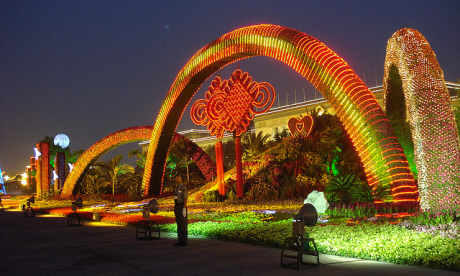
So the 2008 Beijing Olympics has ended to great acclaim, and China has proved beyond all doubt that in a world of global powers, it is a player, a contender and a winner.
So the 2008 Beijing Olympics has ended to great acclaim, and China has proved beyond all doubt that in a world of global powers, it is a player, a contender and a winner. But as the images of its astonishing coming of age party continue to reverberate, via the world’s internet and media, I’m wondering if I’m the only tourist actively put off visiting China by the spectacle?
China has Olympic-sized plans for its tourism industry. Even before the Games it was the world’s fourth most popular tourist destination; in 2007 China earned $214 billion from tourism, and saw a 23% increase in visitor numbers on the previous year. Many of those visitors were investors and business travellers, key players in China’s burgeoning economy. But the Olympic Games was the build-it-and-they-will-come excuse China needed to create the infrastructure of hotels and transport necessary to support a world-class tourism industry. It was also the brochure by which it showcased those impressive services and amenities to the world.
That infrastructure should be impressive: it cost £22 billion. But ironically it’s the sheer scale of that spending that’s turning me off going.
I know that’s ridiculous – it’s a huge country and the Olympics focused on Beijing – but is that China’s future? Where’s the personality in all that glitz – the smells, sights and character that make the country memorable and interesting?
The Beijing (Ka-ching) Olympics was a slick graduate of the Dubai School of Vulgar Excess: where nothing is deemed too showy or expensive. The opening ceremony alone is estimated to have cost £300 million.
Meanwhile, Chinese spectators were drilled in the art of appropriate clapping; taxi drivers were banned from eating garlic or onions in their cabs and instructed to brush their teeth after every meal. Everything was to be untroublingly perfect, for the media and the tourists that would follow.
But are tourists really that fragile? And don’t we travel precisely because we want to be challenged and see life lived differently? Or are we conveniently overlooking the fact that it’s China’s love of the epic gesture that’s created most of the tourist attractions – the Terracotta Warriors, Summer Palace, the Great Wall – in the first place?
Maybe I’m just the wrong kind of tourist, for savouring my pre-Olympic Beijing taxi ride last year: the cab interior steeped in a brutal raw-onion-garlic-tobacco-air-freshener medley, which acted as a kind of colonic irrigation for the sinuses.
There again, with more than 50% of the new hotels remaining empty during the Olympics, as business travellers stayed away and travellers struggled with visa restrictions and paying the 300% mark-up in prices, maybe we have yet to find the tourists of China’s future?
But whether China needs to embrace its warts-and-all uniqueness or hide it behind an opulent facade is
a matter for debate. And as they say, it ain’t over till the little girl with the crooked teeth sings.